There is much more to the Bichon Frise than their posh appearance and elegant demeanor. While their looks may steal the show initially, it’s their loving personality that sets them apart from the rest. The Bichon Frise is one of the best companions around, and it’s no wonder so many people are proud Bichon parents.
We know you want to be the best Bichon Frise owner possible, so let’s discuss all there is to know about the Bichon Frise breed. In this article we will dive into their growth chart, diet tips, health risks to be aware of, and more.
Let’s get started!
Meet The Bichon Frise
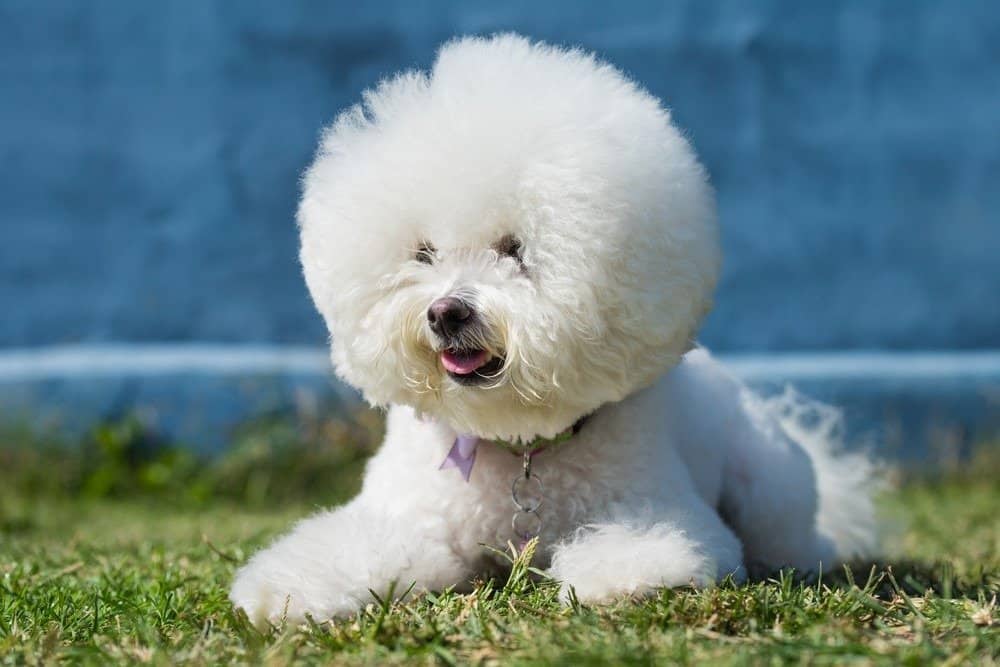
The Bichon Frise has been captured in paintings that date back to the 1500’s.
©Radovancev Zarko/Shutterstock.com
The exact origin of the Bichon Frise is still debated, but most agree that they were likely brought to France in the 1500’s during wartime. The Bichon Frise breed won the hearts of those in the French royal court upon arrival, and their popularity began to spread throughout Europe. It wasn’t long before King Henry III had a Bichon of his own, royal Spanish families considered them prize possessions, and famous artists were including the Bichon in their paintings.
The popularity of the Bichon Frise tapered a bit in the centuries to follow, but French breeders began to work on preserving the breed after World War One. It only took 50 years for the Bichon Frise to make their way to the United States and into AKC recognition, and many welcomed the breed into their homes with open arms.
Bichon Frise Growth and Weight Chart: Month to Month
| Age | Male Weight | Female Weight |
| Birth | Under 1 pound | Under 1 pound |
| 1 Month | 0.5-1 pound | 0.5-1 pound |
| 6 Weeks | 0.75-1.5 pounds | 0.5-1.5 pounds |
| 2 Months | 2-4 pounds | 2-3 pounds |
| 3 Months | 2.5-5 pounds | 2-4 pounds |
| 4 Months | 3-5.5 pounds | 3-4 pounds |
| 5 Months | 4-6 pounds | 3.5-5.5 pounds |
| 6 Months | 4.5-7 pounds | 4-6 pounds |
| 7 Months | 5-7.5 pounds | 4.5-6.5 pounds |
| 8 Months | 5.5-8 pounds | 5-7 pounds |
| 9 Months | 6-9 pounds | 5.5-7.5 pounds |
| 10 Months | 7-10 pounds | 6-9 pounds |
| 11 Months | 8-12 pounds | 6.5-10 pounds |
| 12 Months | 8-13 pounds | 7-11 pounds |
| 2 Years | 8-13 pounds | 7-11 pounds |
When Will My Bichon Frise Stop Growing?
As a Bichon Frise owner, it’s important to be aware of when your beloved pup will stop growing. Understanding the Bichon’s average growth timeline can help you ensure that they are hitting necessary milestones!
The average Bichon Frise will reach their adult height by the time they are 9 months old, and they should stop growing completely around 10-11 months of age. Some Bichons will fill out a bit in the year to follow, but this is typically just a few extra centimeters around their waist.
How Big Will My Bichon Frise Be When It’s Fully Grown?
Now that you know when you can expect your Bichon Frise to stop growing, it’s time to discuss just how big your Bichon will be when they are fully grown. The average Bichon Frise will weigh anywhere from 7-13 pounds, with male Bichons at the higher end of the scale.
If you need a more accurate idea of how big your Bichon Frise will be when they are fully grown, then we suggest asking to see your puppy’s parents in person when you purchase them. Genetics play a major role in your pup’s eventual size, so seeing their parents will offer you the most accurate idea of what’s ahead for your little one.
When Should My Bichon Frise Stop Eating Puppy Food?
Feeding your growing Bichon Frise a high quality puppy diet is one of the easiest ways to help them grow into a healthy and happy adult! Puppy food not only contains extra ingredients that promote optimal growth, but it also has a high calorie count that keeps up with their energy requirements.
You will want your Bichon Frise to eat puppy food until they reach their mature size, so this means you should give them a puppy diet until they are 10 months old. Once they reach 10 months of age, you can then switch them over to an adult diet created for small breed dogs. Just be sure to do this gradually over a 2 week period, as changing their diet abruptly can lead to an upset stomach.
When Will My Bichon Frise Start Losing Teeth?
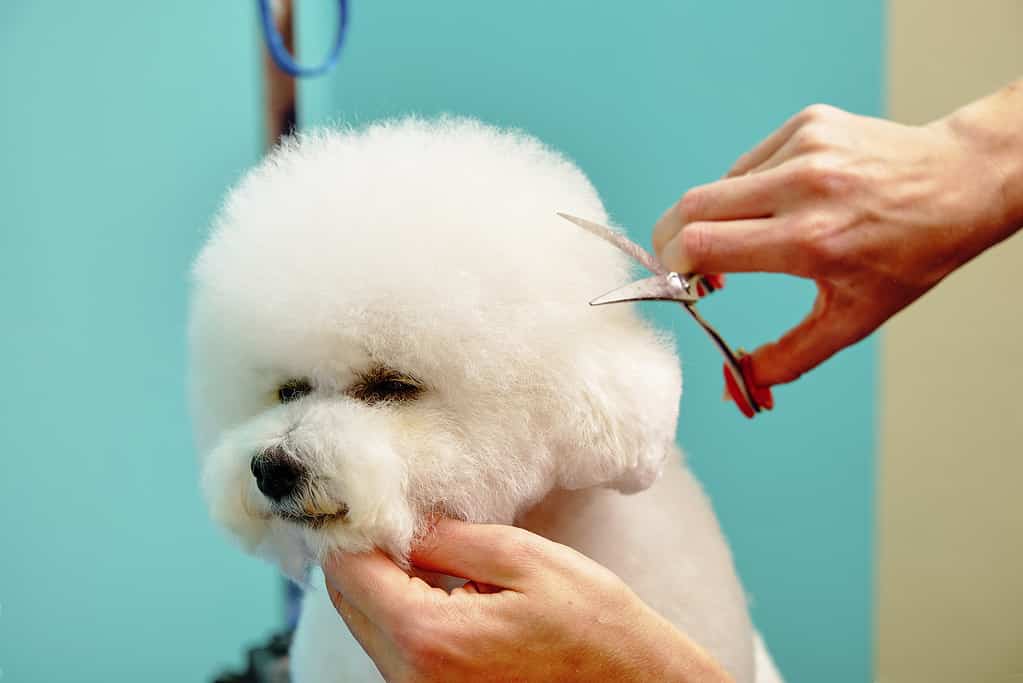
Your Bichon Frise puppy will
start to lose their baby teeth when they are 3 months old.
©iStock.com/Ihar Halavach
Did you know that your Bichon Frise will lose baby teeth throughout their puppyhood, just like human children do? Your Bichon Frise will lose their baby teeth to make way for their permanent adult teeth, and you may even find a few stray puppy teeth around your home during this period.
Your Bichon Frise puppy will start to lose their baby teeth when they are 3 months old. They will lose all their puppy teeth over the next 3 months, but this process will end around 6-7 months of age. By the time your Bichon Frise is 7 months old, they will have a full set of permanent teeth.
When Should I Start Training My Bichon Frise?
The Bichon Frise is known for being highly intelligent, and they catch on to basic obedience training quickly. Though their intelligence helps them grasp basic commands with ease, it can lead to an increased likelihood of stubborn behavior. For this reason, they require consistent training that begins from the moment they enter your home.
Not only is basic obedience training essential for a breed as smart as the Bichon Frise, but they also require daily mental and physical stimulation to help them feel fulfilled. A bored Bichon Frise may turn to undesirable behaviors like chewing and excessive barking, so it’s important to make sure they are getting plenty of attention each day. Consistent training and daily stimulation will help your Bichon Frise grow into a well-rounded companion.
What Commands Should I Teach My Bichon Frise First?
Now that you understand the importance of training your Bichon Frise, it’s time to discuss the most important obedience commands to focus on. These basic cues help to build the foundation for more advanced skills down the line.
We suggest teaching your Bichon Frise the following commands first:
- Sit
- Stay
- Come
- Drop it
- Lay down
In addition to the commands we listed above, it’s also important to work on socializing your Bichon Frise each step of the way. The Bichon can be quite nervous if they are not exposed to new things, and this can make pet parenthood challenging down the line. We always suggest introducing your growing Bichon Frise to new dogs, people, places, and sounds. You can begin to socialize your Bichon from the moment they are fully vaccinated.
When Should My Bichon Frise Be House Broken?
The Bichon Frise is highly intelligent, so they often catch on to the concept of potty training very quickly. As long as you are consistent with your training and outdoor schedule, then most Bichons will be completely housebroken by the time they are 6 months old.
Some tips that can ensure potty training success in your Bichon Frise include having a set feeding schedule, letting them outside multiple times a day, and always taking them outside after naps.
When Should My Bichon Frise Be Spayed or Neutered?
If you do not plan to breed your treasured Bichon Frise, then you may be interested in having them spayed or neutered. Sterilizing your Bichon Frise can decrease the risk of reproductive cancers down the line, and it can even decrease the likelihood of bad behavior driven by hormones.
The best time to spay or neuter your Bichon Frise is between the age of 6 months to 1 year. A 6 month old Bichon Frise is mature enough to do well under anesthesia, and a 1 year old Bichon Frise is still young enough to avoid hormone driven behaviors. Though most vets will agree with the 6 month to 1 year timeline for sterilization, we still suggest speaking with your vet directly about what’s best for your pup.
Common Health Issues In The Bichon Frise
Most Bichon Frise pups will have 12 to 15 years of health and happiness, but there are a few medical conditions they are more at risk of developing. We want you to be able to identify these issues if they ever develop in your pup, so let’s list some of the most common health issues in the Bichon Frise below.
Bladder complications: The Bichon Frise has a high risk of developing bladder issues such as urinary tract infections and bladder stones. While UTI’s can be treated with antibiotic therapy and pain medication, bladder stones require more involved intervention like prescription diets and surgery. Some of the most common symptoms of bladder complications in dogs include urinating frequently, squatting multiple times with small amounts of urine being produced, crying out when urinating, attempting to urinate but nothing is produced, bloody urine, foul smelling urine, anorexia, and vomiting.
Vaccine reactions: The Bichon is more likely to experience an allergic reaction to their vaccines. For this reason, we suggest keeping a close eye on them in the 6-72 hours after their vaccinations. Common vaccine reaction symptoms include skin redness, facial swelling, hives, itchy skin, GI upset, and breathing complications.
Allergies: The Bichon Frise has an increased risk of developing irritating allergies. Dogs can experience environmental allergies, contact allergies, and even allergies to the food they eat each day. Some of the common signs of allergies in dogs include red skin, itchy skin, dry skin, eye irritation, eye discharge, nasal discharge, sneezing, skin infections, ear infections, anal gland issues, and GI upset.
Luxating patellas: Patellar luxation in dogs occurs when there is a misalignment of the canine knee joint. This leads to the instability of the dog’s knee joint, allowing the kneecap to slide out of place during activity. Not only is this painful for the Bichon when it occurs, but it can lead to knee damage and arthritis over time. Some of the common signs of patellar luxation in dogs includes limping, skipping when walking or running, knee stiffness, and leg sensitivity.
Not all Bichon Frise pups will develop the health conditions we discussed above, but it’s still important to be aware of these common complications! Once you are aware of the symptoms we listed, you can jump into action if they ever develop in your beloved Bichon.
Pictures of a Bichon Frise Puppy
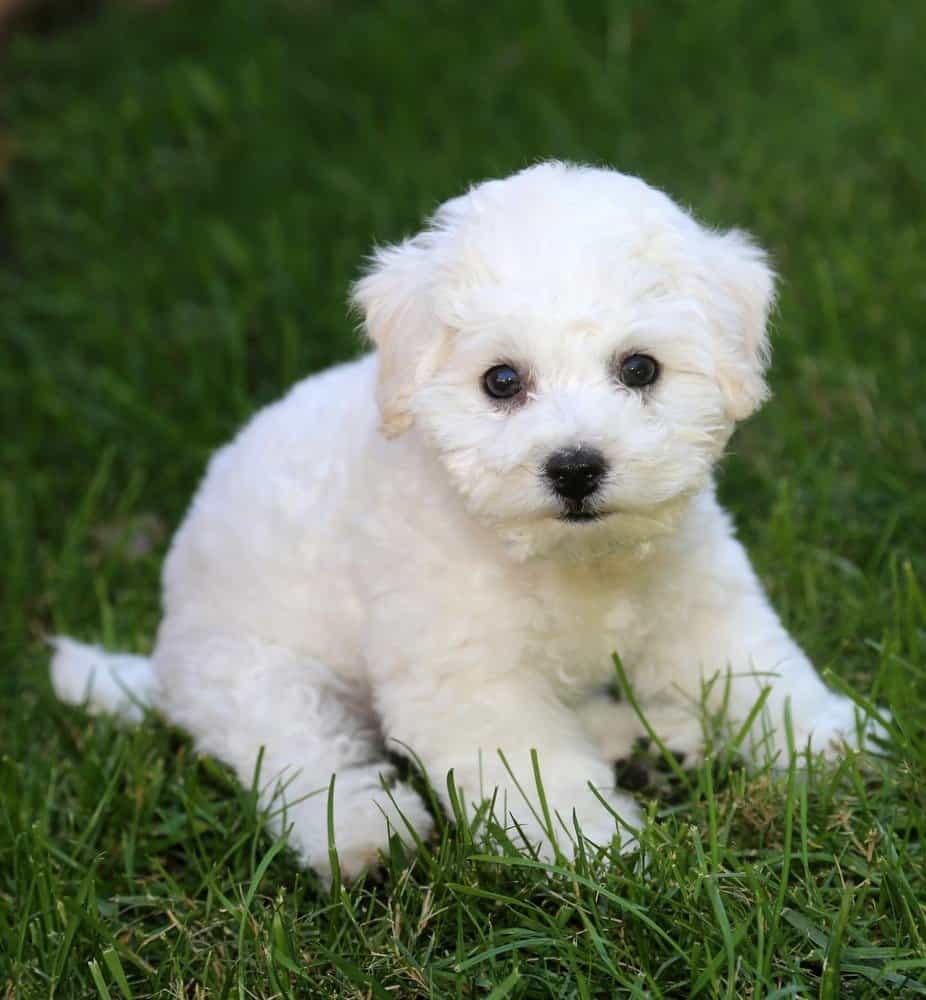
The Bichon Frise is known for being highly intelligent, so they are often curious and adventurous puppies!
©mikeledray/Shutterstock.com
Pictures of The Bichon Frise at 6 Months

The Bichon Frise loves nothing more than spending quality time with their owners.
©Svetography/Shutterstock.com
Pictures of The Fully Grown Bichon Frise
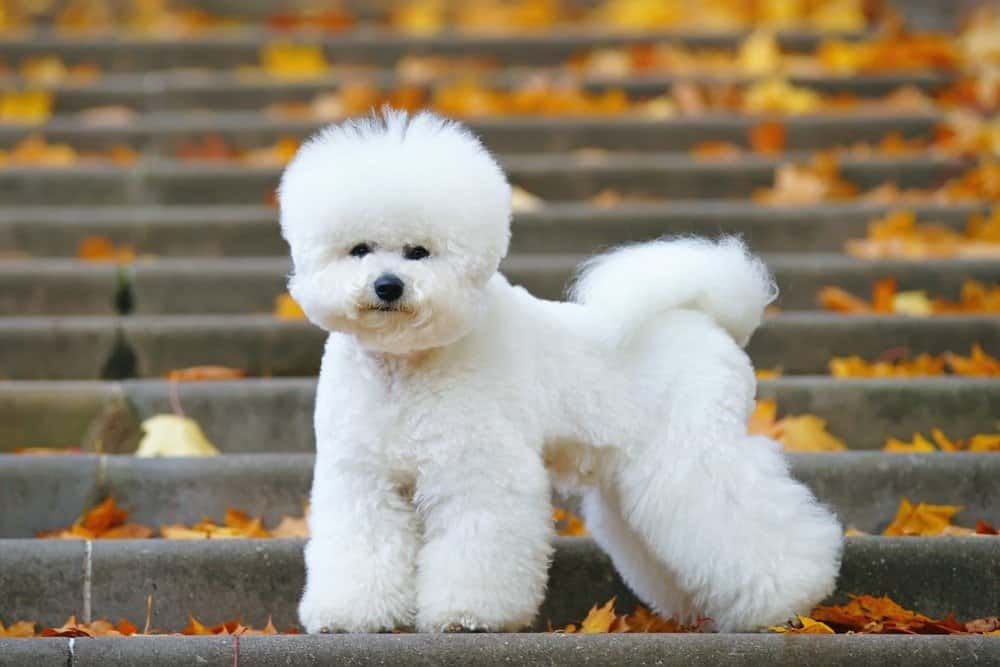
The Bichon Frise was popular among royalty in the 1500’s!
©Eudyptula/Shutterstock.com
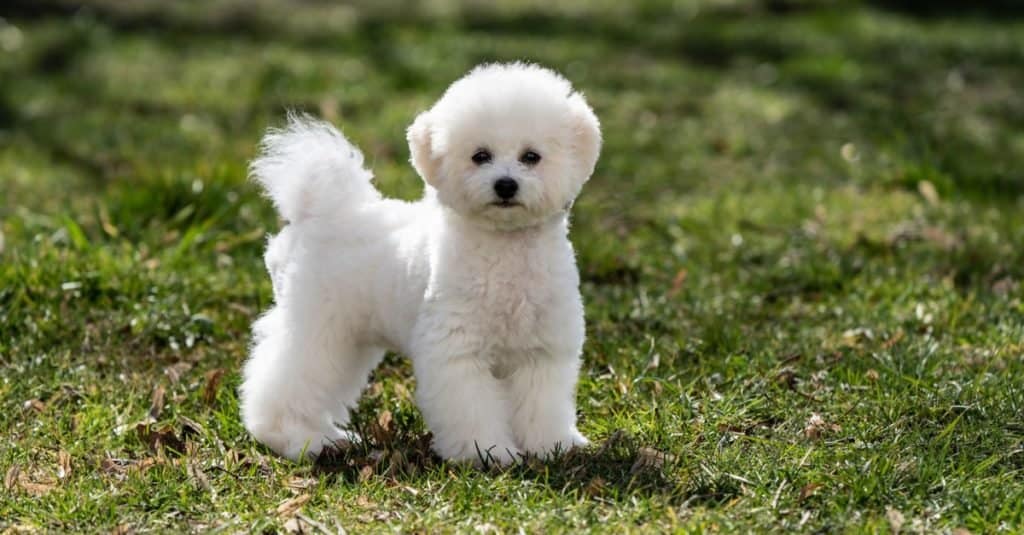
The Bichon Frise needs daily mental and physical stimulation to thrive.
©Ieva Tvaronavicute/Shutterstock.com
Are you ready to welcome the incredible Bichon Frise into your family?
The photo featured at the top of this post is © Svetography/Shutterstock.com
Ready to discover the top 10 cutest dog breeds in the entire world?
How about the fastest dogs, the largest dogs and those that are -- quite frankly -- just the kindest dogs on the planet? Each day, AZ Animals sends out lists just like this to our thousands of email subscribers. And the best part? It's FREE. Join today by entering your email below.
Thank you for reading! Have some feedback for us? Contact the AZ Animals editorial team.






